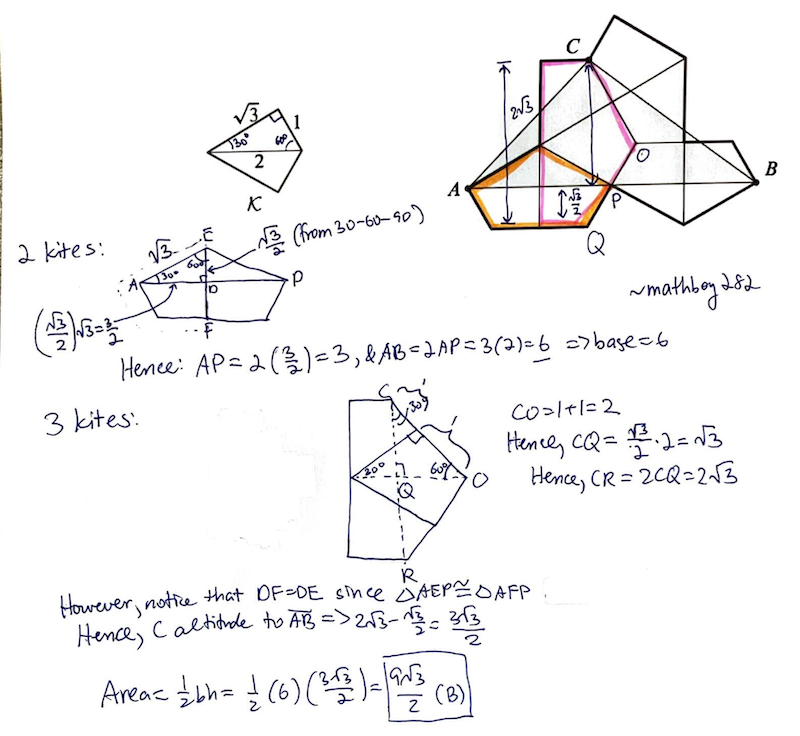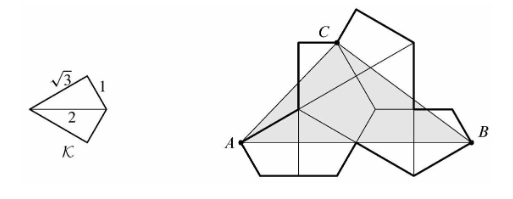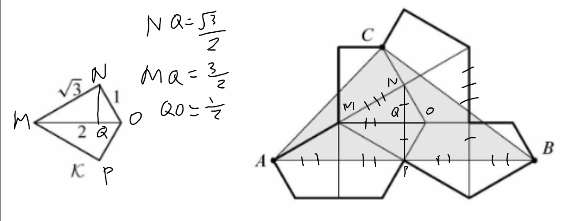Difference between revisions of "2024 AMC 10A Problems/Problem 22"
Happysharks (talk | contribs) (→Solution 1) |
Happysharks (talk | contribs) (→Solution 1) |
||
| Line 8: | Line 8: | ||
==Solution 1== | ==Solution 1== | ||
| − | First, we should find the length of <math>AB</math>. In order to do this, as we see in the diagram, it can be split into 4 sections. Since diagram <math>K</math> shows us that it is made up of two <math>{30,60,90}</math> triangles, then the triangle outlined in red must be a <math>30,60,90</math> triangle. Also, since we know the length of the longest side is <math>{\sqrt3}</math>, then the side we are looking for, which is outlined in blue, must be <math>\frac{3}{2}</math> by the <math>{1,\sqrt3, 2}</math> relationship of <math>{30,60,90}</math> triangles. Therefore <math>AB</math>, which is the base of the triangle we are looking, for must be {6}. | + | |
| + | First, we should find the length of <math>AB</math>. In order to do this, as we see in the diagram, it can be split into 4 equal sections. Since diagram <math>K</math> shows us that it is made up of two <math>{30,60,90}</math> triangles, then the triangle outlined in red must be a <math>30,60,90</math> triangle, as <math>{30+30=60}</math>, and the two lines are perpendicular (is is proveable, but during competition, it is best to assume this is true, as the diagram is draw pretty well to scale). Also, since we know the length of the longest side is <math>{\sqrt3}</math>, then the side we are looking for, which is outlined in blue, must be <math>\frac{3}{2}</math> by the <math>{1,\sqrt3, 2}</math> relationship of <math>{30,60,90}</math> triangles. Therefore <math>AB</math>, which is the base of the triangle we are looking, for must be {6}. | ||
Revision as of 16:19, 9 November 2024
Contents
Problem
Let ![]() be the kite formed by joining two right triangles with legs
be the kite formed by joining two right triangles with legs ![]() and
and ![]() along a common hypotenuse. Eight copies of
along a common hypotenuse. Eight copies of ![]() are used to form the polygon shown below. What is the area of triangle
are used to form the polygon shown below. What is the area of triangle ![]() ?
?
![]()
Solution 1
First, we should find the length of ![]() . In order to do this, as we see in the diagram, it can be split into 4 equal sections. Since diagram
. In order to do this, as we see in the diagram, it can be split into 4 equal sections. Since diagram ![]() shows us that it is made up of two
shows us that it is made up of two ![]() triangles, then the triangle outlined in red must be a
triangles, then the triangle outlined in red must be a ![]() triangle, as
triangle, as ![]() , and the two lines are perpendicular (is is proveable, but during competition, it is best to assume this is true, as the diagram is draw pretty well to scale). Also, since we know the length of the longest side is
, and the two lines are perpendicular (is is proveable, but during competition, it is best to assume this is true, as the diagram is draw pretty well to scale). Also, since we know the length of the longest side is ![]() , then the side we are looking for, which is outlined in blue, must be
, then the side we are looking for, which is outlined in blue, must be ![]() by the
by the ![]() relationship of
relationship of ![]() triangles. Therefore
triangles. Therefore ![]() , which is the base of the triangle we are looking, for must be {6}.
, which is the base of the triangle we are looking, for must be {6}.
Now all we have to do is find the height. We can split the height into 2 sections, the green and the light green. The green section must be ![]() , as
, as ![]() shows us. Also, the light green section must be equal to
shows us. Also, the light green section must be equal to ![]() , as in the previous paragraph, the triangle outlined in red is
, as in the previous paragraph, the triangle outlined in red is ![]() . Then, the green section, which is the height, must be
. Then, the green section, which is the height, must be ![]() , which is just
, which is just ![]() .
.
Then the area of the triangle must be ![]() , which is just
, which is just ![]()
~Solution by HappySharks
Solution 2
Let ![]() be quadrilateral
be quadrilateral ![]() . Drawing line
. Drawing line ![]() splits the triangle into
splits the triangle into ![]() .
Drawing the altitude from
.
Drawing the altitude from ![]() to point
to point ![]() on line
on line ![]() , we know
, we know ![]() is
is ![]() ,
, ![]() is
is ![]() , and
, and ![]() is
is ![]() .
.
Due to the many similarities present, we can find that ![]() is
is ![]() , and the height of
, and the height of ![]() is
is ![]()
![]() is
is ![]() and the height of
and the height of ![]() is
is ![]() .
.
Solving for the area of ![]() gives
gives ![]() which is
which is ![]()
~9897 (latex beginner here)
~i_am_suk_at_math(very minor latex edits)
Solution 3
Let's start by looking at kite ![]() . We can quickly deduce based off of the side lengths that the kite can be split into two
. We can quickly deduce based off of the side lengths that the kite can be split into two ![]() triangles. Going back to the triangle
triangles. Going back to the triangle ![]() , focus on side
, focus on side ![]() . There are
. There are ![]() kites, they are all either reflected over the line
kites, they are all either reflected over the line ![]() or a line perpendicular to
or a line perpendicular to ![]() , meaning the length of
, meaning the length of ![]() can be split up into 4 equal parts.
can be split up into 4 equal parts.
Pick out the bottom-left kite, and we can observe that the kite and the triangle formed by the intersection of the kite and ![]() share a
share a ![]() degree angle. (this was deduced from the
degree angle. (this was deduced from the ![]() triangles in the kite) The line AB and the right side of the kite are perpendicular, forming a
triangles in the kite) The line AB and the right side of the kite are perpendicular, forming a ![]() angle. Because that is also a
angle. Because that is also a ![]() triangle with a hypotenuse of
triangle with a hypotenuse of ![]() , so we find the length of AB to be
, so we find the length of AB to be ![]() , which is
, which is ![]() .
.
Then, we can drop an altitude from ![]() to
to ![]() . We know that will be equivalent to the sum of the longer side of the kite and the shorter side of the triangle formed by the intersection of the kite and
. We know that will be equivalent to the sum of the longer side of the kite and the shorter side of the triangle formed by the intersection of the kite and ![]() . (Look at the line formed on the left of
. (Look at the line formed on the left of ![]() that drops down to
that drops down to ![]() if you are confused) We already have those values from the
if you are confused) We already have those values from the ![]() triangles, so we can just plug it into the triangle area formula,
triangles, so we can just plug it into the triangle area formula, ![]() . We get
. We get ![]()
~YTH (Need help with Latex and formatting)
~WIP (Header)
~Tacos_are_yummy_1 (![]() & Formatting)
& Formatting)
Solution 4 (On Paper)
 (latexing a WIP)
~mathboy282
~Thesmartgreekmathdude
(latexing a WIP)
~mathboy282
~Thesmartgreekmathdude
Solution 5
Let the point of intersection of ![]() and the kite with
and the kite with ![]() as vertex be
as vertex be ![]() .
.
Let the left kite with ![]() as a vertex touch the kite with
as a vertex touch the kite with ![]() as vertex at point
as vertex at point ![]() .
.
![]() is a
is a ![]() so
so ![]() and
and ![]() .
.
So, ![]() and
and ![]() , and the area is
, and the area is ![]()
~Mintylemon66
Video Solution by Innovative Minds
https://www.youtube.com/watch?v=bhC58BB3kJA
~i_am_suk_at_math_2
See also
| 2024 AMC 10A (Problems • Answer Key • Resources) | ||
| Preceded by Problem 21 |
Followed by Problem 23 | |
| 1 • 2 • 3 • 4 • 5 • 6 • 7 • 8 • 9 • 10 • 11 • 12 • 13 • 14 • 15 • 16 • 17 • 18 • 19 • 20 • 21 • 22 • 23 • 24 • 25 | ||
| All AMC 10 Problems and Solutions | ||
The problems on this page are copyrighted by the Mathematical Association of America's American Mathematics Competitions. 











